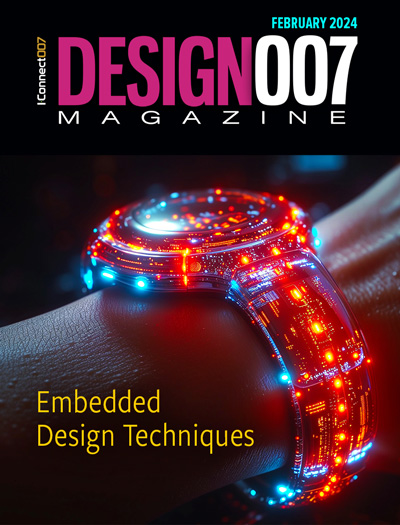-

- News
- Books
Featured Books
- design007 Magazine
Latest Issues
Current Issue
Level Up Your Design Skills
This month, our contributors discuss the PCB design classes available at IPC APEX EXPO 2024. As they explain, these courses cover everything from the basics of design through avoiding over-constraining high-speed boards, and so much more!

Opportunities and Challenges
In this issue, our expert contributors discuss the many opportunities and challenges in the PCB design community, and what can be done to grow the numbers of PCB designers—and design instructors.

Embedded Design Techniques
Our expert contributors provide the knowledge this month that designers need to be aware of to make intelligent, educated decisions about embedded design. Many design and manufacturing hurdles can trip up designers who are new to this technology.
- Articles
- Columns
Search Console
- Links
- Events
||| MENU - design007 Magazine
Altium LLC Announces Partnership With Chandigarh University to Join Upverter Education Program
December 17, 2021 | Business WireEstimated reading time: 1 minute
Altium LLC is announcing that Upverter Education, Altium’s free browser-based electronics engineering essential courses, will now be an integral addition to the curriculum for printed circuit board (PCB) design in the Department of Electronics and Communications at Chandigarh University in Mohali, India. The Upverter Education courses guide students through the elements of design, prototyping, and the manufacturing of electronic engineering from basic to advanced levels.
The Upverter Education program’s collaborative and remote capabilities make it an excellent learning resource to enrich the experience of STEM educators and students engaged in the study of electronic design and engineering technology. The focus on modular board style encourages students to quickly develop their understanding while easily performing elementary concepts in virtual, hybrid, and in-class scenarios. The modular layout plan also delves deeper into electronic design practices, permitting learners to work with a drag-and-fall interface into the development of hardware design patterns.
“We are delighted to have forged a partnership with Chandigarh University, a leading academic institution based in India to provide Upverter Education’s award-winning courses in printed circuit board design along with Altium's professional PCB design tools,” said Rea Callender, Vice President of Altium Education. “A collaboration such as this furthers our goal in supporting the next generation of electronics designers.”
The Department of Electronics and Communications at Chandigarh University will launch the Upverter Education Program as a six-week course during summer and winter breaks.
The Department of Electronics and Communications will hold a ceremony on December 16, 2021, to formalize the partnership between the University and Upverter Education.
Upverter Education partners with universities around the world to help usher in the next generation of electronics designers not only with the objective to support their educational goals but to also create dynamic innovators who contribute to the future and development of electrical engineering.
Suggested Items
Book Excerpt: The Printed Circuit Assembler’s Guide to... Factory Analytics
04/24/2024 | I-Connect007 Editorial TeamIn our fast-changing, deeply competitive, and margin-tight industry, factory analytics can be the key to unlocking untapped improvements to guarantee a thriving business. On top of that, electronics manufacturers are facing a tremendous burden to do more with less. If you don't already have a copy of this book, what follows is an excerpt from the introduction chapter of 'The Printed Circuit Assembler’s Guide to... Factory Analytics: Unlocking Efficiency Through Data Insights' to whet your appetite.
Elevating PCB Design Engineering With IPC Programs
04/24/2024 | Cory Blaylock, IPCIn a monumental stride for the electronics manufacturing industry, IPC has successfully championed the recognition of the PCB Design Engineer as an official occupation by the U.S. Department of Labor (DOL). This pivotal achievement not only underscores the critical role of PCB design engineers within the technology landscape, but also marks the beginning of a transformative journey toward nurturing a robust, skilled workforce ready to propel our industry into the future.
Winner of The Science Show Rakett 69 Receives Incap Scholarship
04/24/2024 | IncapThe winner of the Rakett 69 science show, Andri Türkson, who stood out as an electronics enthusiast, received a scholarship from Incap Estonia, along with an internship opportunity in Saaremaa.
Alternative Manufacturing Inc. Awarded QML Requalification to IPC J-STD-001 and IPC-A-610
04/24/2024 | IPCIPC's Validation Services Program has awarded an IPC J-STD-001 and IPC-A-610 Qualified Manufacturers Listing (QML) requalification to Alternative Manufacturing Inc (AMI).
Boeing's Janene Stinson Earns IPC Excellence in Education Award at IPC APEX EXPO 2024
04/22/2024 | IPCThe IPC Excellence in Education award was presented to Janene Stinson, Boeing, at IPC APEX EXPO 2024 in Anaheim, California, in recognition of her significant contributions to workforce development and leadership.


